
- Home
- India
- World
- Premium
- THE FEDERAL SPECIAL
- Analysis
- States
- Perspective
- Videos
- Sports
- Education
- Entertainment
- Elections
- Features
- Health
- Business
- Series
- In memoriam: Sheikh Mujibur Rahman
- Bishnoi's Men
- NEET TANGLE
- Economy Series
- Earth Day
- Kashmir’s Frozen Turbulence
- India@75
- The legend of Ramjanmabhoomi
- Liberalisation@30
- How to tame a dragon
- Celebrating biodiversity
- Farm Matters
- 50 days of solitude
- Bringing Migrants Home
- Budget 2020
- Jharkhand Votes
- The Federal Investigates
- The Federal Impact
- Vanishing Sand
- Gandhi @ 150
- Andhra Today
- Field report
- Operation Gulmarg
- Pandemic @1 Mn in India
- The Federal Year-End
- The Zero Year
- Science
- Brand studio
- Newsletter
- Elections 2024
- Events
- Home
- IndiaIndia
- World
- Analysis
- StatesStates
- PerspectivePerspective
- VideosVideos
- Sports
- Education
- Entertainment
- ElectionsElections
- Features
- Health
- BusinessBusiness
- Premium
- Loading...
Premium - Events

By stepping down, he will try at once to become much more consequential politically than what he otherwise could have been for his party in the Haryana polls
The Supreme Court is not a court of bails, and the Delhi government has never been like its keenly watched counterparts in some other states, say West Bengal or Tamil Nadu. Yet Arvind Kejriwal has hogged more attention in recent times than the chief ministers of all other states. This has been so thanks to the Centre and its hefty weapons, such as the Enforcement Directorate (ED) and the Central Bureau of Investigation (CBI).
Both agencies have virtually paraded Kejriwal from one court to another for the past six months or so — until he got regular bail on Friday (September 13) from the top court, though with a few restrictions, such as not attending office and not signing files unless sent or asked by the Lieutenant-Governor. He came out of Delhi’s Tihar jail that same evening, but with far less power to wield over Delhi than before his arrest.
Resignation with eye on Haryana?
Now, Kejriwal’s move to step down and hand over the reins of the Union Territory of Delhi to another Aam Aadmi Party (AAP) colleague by Tuesday (September 17) is visibly an attempt to thwart the possibility of President’s rule being imposed on Delhi. But then, his tenure is nearing its end and, in any case, the Election Commission will announce the elections to the 70-member Delhi Assembly in less than four months — in the first half of January 2025, to be more precise.
So, flaunting resignation with the kind of gusto that Kejriwal did on Sunday is hardly a big deal. But by doing so, he has tried at once to become much more consequential in political terms than what he otherwise could have been for his party in the upcoming Haryana Assembly polls on October 5.
Kejriwal’s game of positioning
If politics is a game of positioning, Kejriwal is a keen player. By resigning at the end of his second full term as the Delhi chief minister, he will position himself as the main force against the BJP and Prime Minister Narendra Modi. This has so far been the preserve of the Congress — in Haryana and, with other state-level parties, in the election-bound Maharashtra. AAP does not have the organizational wherewithal to take on the might of the BJP and Modi alone in these states.
This is why the AAP has, until recently, been toying with the idea of forging an alliance with the Congress in Haryana. But the move could not succeed, as the seat-sharing talks fell through, and both the AAP and the Congress went on to field candidates for all 90 seats in the Assembly.
Vote split to help BJP
So, Haryana now awaits a multi-cornered contest where, besides the Congress and the AAP, two more regional alliances will try to defeat the BJP. This, in turn, is likely to split votes and help the BJP more than the Congress, which otherwise had a fair chance to humble the BJP, which has been in power in Haryana for the past 10 years.
Fighting alone, the AAP has so far failed to make any dent in the ruling party’s votes in BJP-dominated states such as Goa and Gujarat. The AAP did manage to get a clear majority in Punjab two years ago and succeeded in forming the government, but it was the Congress that it upstaged, as the BJP has only marginal presence in Punjab.
AAP-BJP’s strange poll record
In Delhi, too, successive Lok Sabha and Vidhan Sabha polls held since 2014 have shown that though the AAP has been hugely successful in the Assembly polls, it could not win a single Lok Sabha seat in the three parliamentary polls held in this time. In the last parliamentary polls held earlier this year, the AAP-Congress alliance in Delhi together took on the BJP, but they lost all seven Lok Sabha seats to the latter.
Thus, the AAP has essentially ended up being a regional force in Delhi, and it is a mystery how it won 67 and 62 seats of the Delhi Assembly in 2015 and 2020, respectively, but could not win even a single Lok Sabha seat in 2014, 2019, and 2024. In fact, Kejriwal’s critics often smell a tacit understanding between the AAP and the BJP to share power in Delhi.
Charisma of Kejriwal
However, the question now is whether the current drama being played out in Delhi, months before the Assembly polls, will bring the kind of results that Kejriwal may look for. He says he will not take the chief minister’s chair until he is voted back to power by the people of Delhi in the February polls.
But in the meantime, he is going to campaign in Haryana for his party’s candidates who, indeed, need some charisma to make their presence felt. The charisma of Kejriwal has somehow been rather confined to harming the Congress and leaving the BJP unscathed so far. In the Delhi Vidhan Sabha, the Congress has been drawing a nil in the past two elections while three and eight BJP MLAs got elected in 2015 and 2020, respectively.
Kejriwal’s U-turn
However, after the ED turned its heat against him, the AAP supremo warmed to the INDIA coalition before the Lok Sabha polls this year. The AAP, as part of the coalition, did get more votes in four Delhi seats and one in Haryana than it did before, but none of the AAP candidates could romp home.
However, Kejriwal now appears to be in no mood to carry the ties with the Congress forward. Evidently, he has other plans. So, both the Congress and its INDIA partners appear to be surprised, or rather shocked, by Kejriwal’s latest move to resign and go solo and challenge the BJP first in Haryana and possibly next in Delhi.
(The Federal seeks to present views and opinions from all sides of the spectrum. The information, ideas or opinions in the articles are of the author and do not necessarily reflect the views of The Federal)


